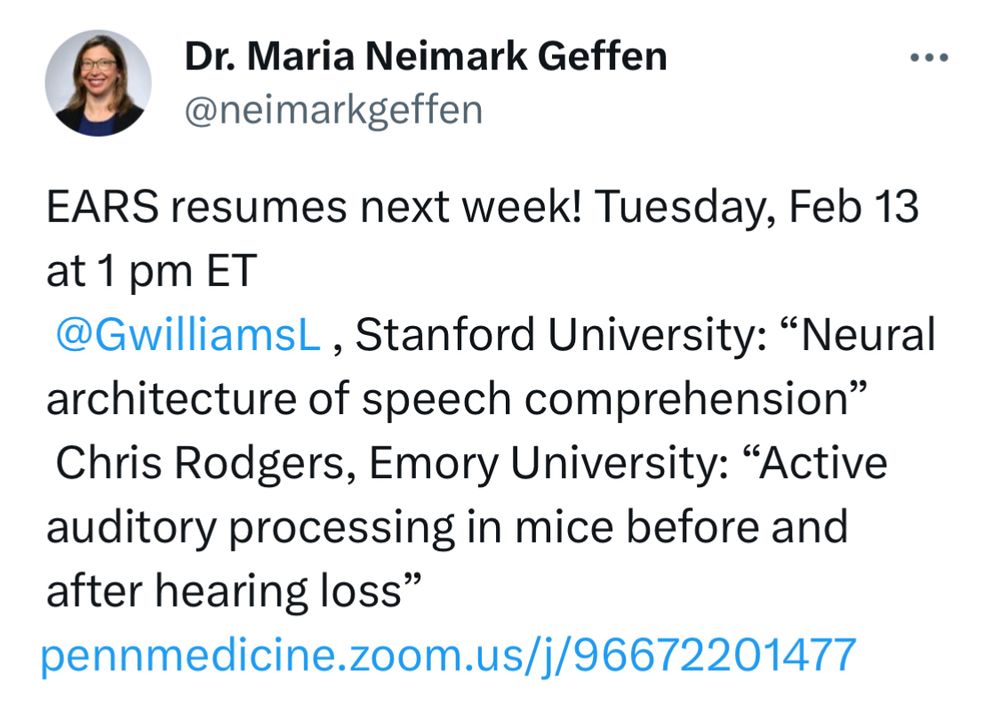Chris Rodgers
@chrisxrodgers.bsky.social
Neuroscientist. My group at Emory researches how the brain integrates perception and action for free behavior
I'm seeing a lot of folks post this with the caption "Dartmouth says no" or similar. I don't think that this message actually says "no". It says they are "committed" and will "defend" and "do better", but no actual action is specified - not even rejecting the compact. Keep the pressure on!

October 4, 2025 at 9:28 PM
I'm seeing a lot of folks post this with the caption "Dartmouth says no" or similar. I don't think that this message actually says "no". It says they are "committed" and will "defend" and "do better", but no actual action is specified - not even rejecting the compact. Keep the pressure on!
The AAUP is doing many of the things that many of us wish our universities were doing, such as leading litigation to protect academic freedom on behalf of faculty, students, and even the universities themselves. Faculty, please consider joining them!
www.aaup.org/issues-highe...
www.aaup.org/issues-highe...

May 28, 2025 at 2:43 PM
The AAUP is doing many of the things that many of us wish our universities were doing, such as leading litigation to protect academic freedom on behalf of faculty, students, and even the universities themselves. Faculty, please consider joining them!
www.aaup.org/issues-highe...
www.aaup.org/issues-highe...
It's projected onto a tiny screen on the inside of your forehead so PFC can watch and decide what to do about it. Like this!

May 12, 2025 at 11:45 PM
It's projected onto a tiny screen on the inside of your forehead so PFC can watch and decide what to do about it. Like this!
Douglas Hofstadters book Metamagical Themas remains strikingly relevant. His essay “Sanity and Survival” on the individual‘s choice to cooperate in generalized prisoners’ dilemma-type scenarios: “Apathy on the individual level translates into insanity at the population level.”

May 5, 2025 at 3:00 AM
Douglas Hofstadters book Metamagical Themas remains strikingly relevant. His essay “Sanity and Survival” on the individual‘s choice to cooperate in generalized prisoners’ dilemma-type scenarios: “Apathy on the individual level translates into insanity at the population level.”
Big crowd today marching from Piedmont Pk to Georgia state capitol.
Don't let the disaster feel unstoppable - people are not okay with what is happening!
Don't let the disaster feel unstoppable - people are not okay with what is happening!

April 5, 2025 at 10:12 PM
Big crowd today marching from Piedmont Pk to Georgia state capitol.
Don't let the disaster feel unstoppable - people are not okay with what is happening!
Don't let the disaster feel unstoppable - people are not okay with what is happening!
I think this picture speaks for itself

March 29, 2025 at 12:48 AM
I think this picture speaks for itself
Rally in support of CDC, federal workers, and scientific research yesterday. I felt overwhelmed and anxious before I arrived, but I left feeling invigorated by our shared purpose.
People say, "Why isn't anyone speaking out against this disaster?" and I would respond, "We are! Come join us!"
People say, "Why isn't anyone speaking out against this disaster?" and I would respond, "We are! Come join us!"

March 13, 2025 at 3:29 PM
Rally in support of CDC, federal workers, and scientific research yesterday. I felt overwhelmed and anxious before I arrived, but I left feeling invigorated by our shared purpose.
People say, "Why isn't anyone speaking out against this disaster?" and I would respond, "We are! Come join us!"
People say, "Why isn't anyone speaking out against this disaster?" and I would respond, "We are! Come join us!"
It felt good showing up to support CDC workers with @marjoriepak.bsky.social and David Weinshenker (both @emorycollege.bsky.social faculty). I loved seeing smiles on CDC employees' faces when they saw our signs, and I hope it helped them feel better. Please show up and speak out! We are not alone!


February 20, 2025 at 1:13 AM
It felt good showing up to support CDC workers with @marjoriepak.bsky.social and David Weinshenker (both @emorycollege.bsky.social faculty). I loved seeing smiles on CDC employees' faces when they saw our signs, and I hope it helped them feel better. Please show up and speak out! We are not alone!
Within 24h of announced cuts to overhead, Emory leadership launched a plan to unite with other institutions, advocate to gov, and fight back. Great! Now, let's apply the *exact same tactic* to ALL the challenges facing our unit - threats to diversity, academic freedom, trans and immigrant rights,etc

February 9, 2025 at 12:25 AM
Within 24h of announced cuts to overhead, Emory leadership launched a plan to unite with other institutions, advocate to gov, and fight back. Great! Now, let's apply the *exact same tactic* to ALL the challenges facing our unit - threats to diversity, academic freedom, trans and immigrant rights,etc
This is a roofer trying to explain "drip edge" to me. I want to use this as an example of jargon for my students. When you don't understand enough words in a sentence, it starts to sound like Shakespeare😆

January 16, 2025 at 1:02 AM
This is a roofer trying to explain "drip edge" to me. I want to use this as an example of jargon for my students. When you don't understand enough words in a sentence, it starts to sound like Shakespeare😆
Excited to speak at the auditory symposium EARS next week alongside Dr Laura Gwilliams! Stop by if you want to hear about our latest work! Free and online
www.med.upenn.edu/pennhearing/...
www.med.upenn.edu/pennhearing/...

February 9, 2024 at 3:19 AM
Excited to speak at the auditory symposium EARS next week alongside Dr Laura Gwilliams! Stop by if you want to hear about our latest work! Free and online
www.med.upenn.edu/pennhearing/...
www.med.upenn.edu/pennhearing/...
6/7 In sum: perception and action are almost always linked, at least outside of most lab tasks. The way we move around can help us learn about our world better, and to build resilience to sensory loss. Next up: studying the distributed neural circuits that link sensory processing and motor control!

January 10, 2024 at 1:57 AM
6/7 In sum: perception and action are almost always linked, at least outside of most lab tasks. The way we move around can help us learn about our world better, and to build resilience to sensory loss. Next up: studying the distributed neural circuits that link sensory processing and motor control!
5/7 With Dr Kaitlyn Brooks, a resident surgeon in Otolaryngology, we figured out how to test hearing loss in these mice. Mice with unilateral hearing loss were transiently impaired, but bounced back in just a few days! Video analysis showed they used a new strategy to seek out sound in the maze.

January 10, 2024 at 1:56 AM
5/7 With Dr Kaitlyn Brooks, a resident surgeon in Otolaryngology, we figured out how to test hearing loss in these mice. Mice with unilateral hearing loss were transiently impaired, but bounced back in just a few days! Video analysis showed they used a new strategy to seek out sound in the maze.
4/7 To study this, we trained mice to track down an ongoing sound source in a multi-chambered arena. The sound is ongoing, the mouse can move around however they want, and there's lots of walls. We think this makes it a tad more naturalistic. The mice got super good at this!

January 10, 2024 at 1:55 AM
4/7 To study this, we trained mice to track down an ongoing sound source in a multi-chambered arena. The sound is ongoing, the mouse can move around however they want, and there's lots of walls. We think this makes it a tad more naturalistic. The mice got super good at this!
3/7 Head movement helps localize sound in healthy listeners, hearing impaired, and ppl with cochlear implants. Ever since I started studying this, I notice that when I hear a car coming up behind me while I'm biking, I can localize it better if I turn my head just slightly and listen.

January 10, 2024 at 1:54 AM
3/7 Head movement helps localize sound in healthy listeners, hearing impaired, and ppl with cochlear implants. Ever since I started studying this, I notice that when I hear a car coming up behind me while I'm biking, I can localize it better if I turn my head just slightly and listen.
2/7 In Neuro 101 you learned that we use interaural cues to tell where sounds are coming from. All true if your head is still. But what if you're moving? Like when you lose your phone and have your friend call it - instead of sitting still, you move around the room to track it down.

January 10, 2024 at 1:53 AM
2/7 In Neuro 101 you learned that we use interaural cues to tell where sounds are coming from. All true if your head is still. But what if you're moving? Like when you lose your phone and have your friend call it - instead of sitting still, you move around the room to track it down.
Panel A in particular always bugged me when I taught it. How do we know D2 and D4 have "taken over" the D3 patch? It could alternatively just be that D3 is no longer tested, and so D2 and D4 (formerly second place) are now first.
iiif.elifesciences.org/lax:84716%2F...
iiif.elifesciences.org/lax:84716%2F...

November 24, 2023 at 3:04 PM
Panel A in particular always bugged me when I taught it. How do we know D2 and D4 have "taken over" the D3 patch? It could alternatively just be that D3 is no longer tested, and so D2 and D4 (formerly second place) are now first.
iiif.elifesciences.org/lax:84716%2F...
iiif.elifesciences.org/lax:84716%2F...
6/ Finally I put together a very simple model suggesting that top-down mPFC task signals could selectively amplify specific A1 task circuits. No plasticity required .. just rapid modulation by top-down inputs! Could be good for rapid switching between learned tasks

October 28, 2023 at 4:30 PM
6/ Finally I put together a very simple model suggesting that top-down mPFC task signals could selectively amplify specific A1 task circuits. No plasticity required .. just rapid modulation by top-down inputs! Could be good for rapid switching between learned tasks
5/ I had 3 months to do a causal expt for reviewer. We didn't have opto in the lab which was still somewhat new (2013!). So I rigged up electrical microstimulation to disrupt (not activate/silence) neural activity. Rats couldn't do the task as well with mPFC disrupted

October 28, 2023 at 4:29 PM
5/ I had 3 months to do a causal expt for reviewer. We didn't have opto in the lab which was still somewhat new (2013!). So I rigged up electrical microstimulation to disrupt (not activate/silence) neural activity. Rats couldn't do the task as well with mPFC disrupted
4/ We recorded in A1 & mPFC, expecting tuning/gain changes. Instead: evoked rate completely unaffected but pre-stimulus rate hugely changed depending on which sound the rat would select. Prob bc difficulty of task is selection, not amplification. Also: surprisingly little diff between A1 and mPFC!

October 28, 2023 at 4:28 PM
4/ We recorded in A1 & mPFC, expecting tuning/gain changes. Instead: evoked rate completely unaffected but pre-stimulus rate hugely changed depending on which sound the rat would select. Prob bc difficulty of task is selection, not amplification. Also: surprisingly little diff between A1 and mPFC!

